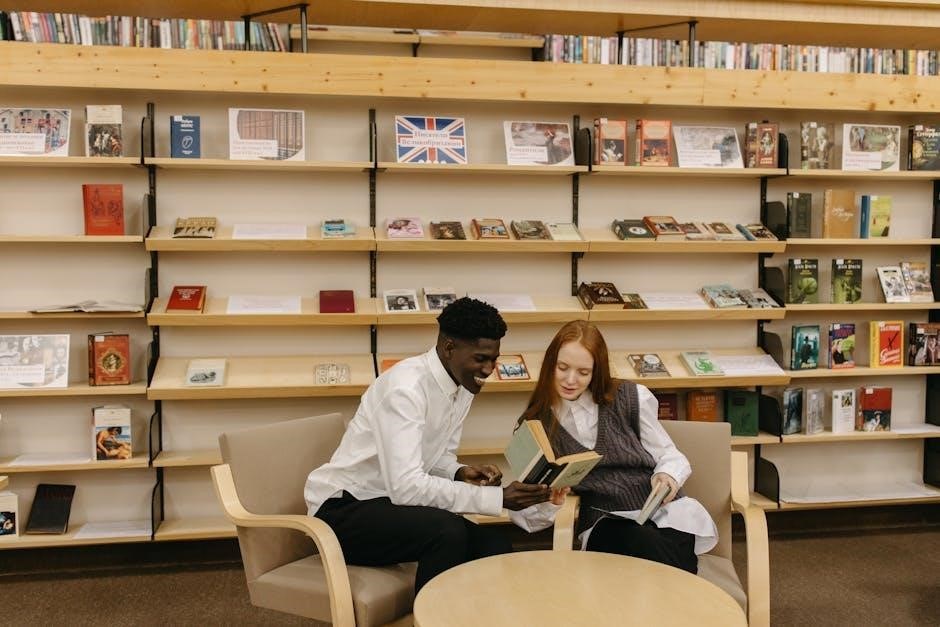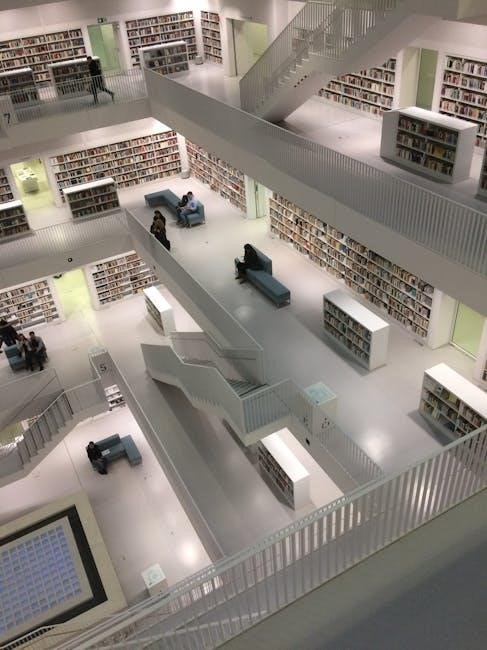The Early Years Foundation Stage (EYFS) is a statutory framework for children from birth to five, shaping their education and care in England. It emphasizes holistic development through play, exploration, and structured activities, fostering essential skills and knowledge for future success.
Overview of the EYFS Framework
The Early Years Foundation Stage (EYFS) framework provides a structured approach to early childhood education and care for children from birth to five years old in England. It is a statutory framework that sets standards for learning, development, and care, ensuring all children receive high-quality education regardless of their background. The framework is divided into seven interconnected areas of learning and development, which guide practitioners in creating holistic and balanced educational programs. These areas are designed to support children’s overall well-being, curiosity, and enthusiasm for learning, while preparing them for future academic and personal success. The EYFS is mandatory for all early years providers, including nurseries, pre-schools, and childminders, ensuring consistency and quality in early years education.
Purpose and Importance of the EYFS
The Early Years Foundation Stage (EYFS) is designed to ensure that children from birth to five years old receive high-quality education and care, laying a strong foundation for future learning and development. Its purpose is to promote holistic growth, fostering social, emotional, physical, and cognitive skills through play and structured activities. The framework emphasizes the importance of early intervention and tailored support to meet individual needs, ensuring all children, regardless of background, have opportunities to thrive. By creating a nurturing and enabling environment, the EYFS prepares children for the challenges of school and beyond, while fostering a lifelong love of learning and exploration.
Key Principles Guiding the EYFS
The EYFS is guided by four core principles that shape its implementation: every child is unique, positive relationships, enabling environments, and learning and development. These principles emphasize the importance of recognizing each child’s individuality and ensuring their needs are met through nurturing relationships and supportive environments. They also highlight that children learn and develop in different ways and at varying rates. By fostering a sense of security, curiosity, and exploration, these principles create a foundation for holistic development. They ensure that early years settings are inclusive, stimulating, and tailored to support each child’s unique journey, laying the groundwork for future success and well-being. These principles are essential for effective practice under the EYFS framework.

The Seven Areas of Learning and Development
The EYFS framework outlines seven interconnected areas of learning, promoting holistic development for children from birth to five. These areas support essential skills and future learning.
Prime Areas of Learning
The Prime Areas of learning are fundamental to children’s development, focusing on Personal, Social, and Emotional Development, Physical Development, and Communication and Language. These areas are crucial for building essential life skills, fostering resilience, and encouraging positive relationships. They provide the foundation for children to express themselves, navigate social interactions, and develop physical coordination. By nurturing these areas, practitioners help children build confidence, self-awareness, and the ability to communicate effectively. These skills are vital for future academic success and emotional well-being, ensuring children are well-prepared for the challenges of school and beyond. The Prime Areas are the cornerstone of the EYFS framework, supporting holistic development and lifelong learning.
Personal, Social, and Emotional Development
This area focuses on helping children develop self-awareness, self-regulation, and social skills. It encourages children to form positive relationships, manage emotions, and develop empathy. Activities promote independence, confidence, and cooperation, fostering a sense of responsibility and respect for others. This foundation is vital for children to navigate social interactions and build resilience. By supporting emotional well-being, practitioners enable children to thrive in all areas of learning. This area is essential for creating a strong foundation for future learning and lifelong well-being, ensuring children can engage successfully with their environment and peers. It is a cornerstone of the EYFS framework, shaping children’s ability to interact and grow emotionally and socially.
Physical Development
Physical Development focuses on children’s growing ability to control their bodies and coordinate movements. It encompasses both gross motor skills, such as running, jumping, and climbing, and fine motor skills, like using hands and fingers to manipulate objects. This area encourages children to develop strength, balance, and coordination through active play and structured activities. Practitioners provide opportunities for children to explore their physical capabilities, such as using tools, dressing, and engaging in sports. Physical Development is vital for overall health, self-care, and confidence. It also supports children in understanding their bodies and maintaining a healthy lifestyle. This area is essential for building the foundation for lifelong physical well-being and independence.
Communication and Language
Communication and Language focuses on children’s ability to express thoughts, ideas, and feelings through verbal and non-verbal means. It includes listening, speaking, and understanding language. This area supports children in developing vocabulary, comprehension, and confidence in using language effectively. Practitioners encourage children to engage in conversations, listen attentively, and respond appropriately. Activities like storytelling, role-playing, and group discussions foster language skills. Children also learn to articulate their needs and describe experiences, building strong communication foundations. This area is crucial for social interaction, emotional expression, and future academic success, enabling children to connect with others and navigate the world effectively. Effective communication skills are vital for lifelong learning and relationships.

Specific Areas of Learning
The Specific Areas of Learning in the EYFS include Literacy, Mathematics, Understanding the World, and Expressive Arts and Design, building foundational skills and knowledge for future success.
Literacy
Literacy in the EYFS focuses on developing essential reading and writing skills, building on the foundations of Communication and Language. It encourages children to explore and enjoy books, rhymes, and stories, fostering a love for reading. Phonics and comprehension are key components, with activities designed to help children decode texts and understand meaning. Writing skills are introduced through playful experiences, such as mark-making and tracing, progressing to simple sentences. Practitioners use engaging strategies to support children in applying their literacy skills across all areas of learning, ensuring a strong foundation for future academic success and lifelong learning.
Mathematics
Mathematics in the EYFS focuses on developing children’s understanding of numbers, patterns, shapes, and measurement through play and real-life experiences. It encourages problem-solving, reasoning, and the application of mathematical concepts in practical contexts. Activities include counting games, sorting objects, and exploring shapes, which help children build foundational numeracy skills. Practitioners use everyday opportunities, such as sharing toys or comparing sizes, to introduce mathematical language and ideas. This area supports children in becoming confident mathematicians, preparing them for more formal learning in later years while fostering a curiosity and enjoyment of mathematical exploration and discovery.
Understanding the World
Understanding the World in the EYFS helps children explore and make sense of their surroundings, fostering curiosity and awareness of the environment, people, and technology. This area encourages children to investigate and learn about their community, cultures, and the natural world. Activities include exploring plants and animals, using technology like computers or cameras, and engaging in discussions about family and society. It promotes an understanding of cause and effect and the concept of time, enabling children to develop a broader perspective of the world around them. This area supports children in becoming thoughtful and informed individuals, prepared to engage with their environment and society.
Expressive Arts and Design
Expressive Arts and Design in the EYFS encourages children to explore and express their creativity through various art forms, such as painting, drawing, music, dance, and role-play. This area fosters imagination, confidence, and self-expression, enabling children to communicate their ideas and emotions. It involves experimenting with materials, tools, and techniques to create individual and collaborative projects. Children also learn to appreciate and respond to different art forms, developing an understanding of the cultural and historical context of creative works. By engaging in expressive arts, children refine their fine motor skills, coordination, and critical thinking while developing a lifelong appreciation for creativity and self-expression. This area supports children in becoming imaginative and innovative thinkers.
Interconnection of the Seven Areas
The seven areas of learning are interconnected, fostering a holistic approach to child development. Each area builds on and supports the others, promoting overall growth and well-being.
How the Areas Support Holistic Development
The seven areas of learning work together to support children’s holistic development, ensuring they grow intellectually, emotionally, socially, and physically. By integrating these areas, practitioners create a balanced curriculum where skills and knowledge from one area enhance learning in others. For example, communication and language skills underpin personal, social, and emotional development, while physical development fosters coordination and confidence. This interconnected approach helps children develop a strong foundation for future learning and life, preparing them to thrive in all aspects of their lives. The EYFS framework ensures that every child’s unique needs are met through this comprehensive and cohesive system.
Examples of Cross-Area Learning Activities
Engaging in cross-area learning activities helps children connect different skills and knowledge seamlessly. For instance, a cooking activity can integrate mathematics (measuring ingredients), understanding the world (learning about food sources), and communication and language (following recipes). Similarly, an art project might combine expressive arts and design (creativity), physical development (fine motor skills), and personal, social, and emotional development (collaboration). Outdoor games can blend physical development (movement) with mathematics (counting steps) and literacy (naming objects); These activities demonstrate how the seven areas work together to support holistic development.

Implementing the EYFS in Practice
Creating an enabling environment, prioritizing play, and using observation, assessment, and planning are key to delivering the EYFS effectively, ensuring children thrive across all seven areas.
Creating an Enabling Environment
Creating an enabling environment is crucial for implementing the EYFS effectively. This involves designing a space that is safe, stimulating, and inclusive, fostering children’s natural curiosity and creativity. The environment should promote independence, allowing children to explore and learn at their own pace. Practitioners must ensure resources are accessible and well-organized, encouraging active engagement across the seven areas of learning. An enabling environment also supports holistic development by integrating indoor and outdoor spaces, providing opportunities for physical activity, and fostering social interaction. By carefully planning the layout and resources, practitioners can create a setting that inspires learning, creativity, and well-being for all children.
Role of Play in Learning
Play is a cornerstone of learning in the EYFS, enabling children to explore, experiment, and make sense of the world. It fosters creativity, problem-solving, and critical thinking while promoting social, emotional, and physical development. Through play, children develop independence, self-confidence, and resilience. The EYFS encourages a balance of adult-led and child-initiated play, allowing practitioners to model skills and concepts while also nurturing children’s natural curiosity. Playful experiences are tailored to individual needs, ensuring inclusivity and supporting learning across all seven areas. By prioritizing play, the EYFS creates a foundation for lifelong learning, helping children develop into capable, curious, and imaginative individuals.
Observation, Assessment, and Planning
Observation, assessment, and planning are integral to the EYFS, enabling practitioners to understand children’s developmental stages and tailor activities to their needs. Through continuous observation, practitioners gather insights into children’s strengths, interests, and challenges. Assessments are used to track progress, identify learning gaps, and inform future planning. Planning is dynamic, adapting to individual and group needs, ensuring activities are engaging and meaningful. This cyclical process supports children’s holistic development, fostering a love for learning and preparing them for future success. Effective use of these strategies ensures that every child receives personalized support, fostering their unique potential across the seven areas of learning.

Practical Activities and Experiences
Practical activities and experiences are vital for children’s development, offering hands-on learning opportunities. These activities, tailored to different age groups, foster exploration, creativity, and skill-building across the seven areas of learning;
Age-Appropriate Activities for Different Developmental Stages
Age-appropriate activities are tailored to meet the unique needs of children at different developmental stages. For infants (birth to three), sensory play and exploratory activities foster curiosity and basic skills. Toddlers (3-4 years) benefit from role-playing, storytelling, and physical games to enhance social and motor skills. Preschoolers (4-5 years) engage in structured games, art projects, and problem-solving tasks to prepare for school. These activities align with the seven areas of learning, ensuring a balanced approach to development. Observation and planning are key to adapting activities to individual needs, promoting progress and fostering a love for learning across all developmental stages.

Inclusive Practice and Adaptations
Inclusive practice ensures all children, including those with diverse needs, thrive within the EYFS framework. Adaptations, such as differentiated instruction and additional resources, support individual learning styles and abilities.
Supporting Children with Diverse Needs
Inclusive practice within the EYFS ensures that children with diverse needs, such as disabilities or special educational needs, are fully supported in their learning and development. The framework emphasizes the importance of identifying individual needs and implementing tailored strategies to ensure every child can thrive. Practitioners are encouraged to create personalized learning plans and adapt activities to meet the unique requirements of each child. This includes providing additional resources, modifying environments, and using assistive technologies where necessary. Collaboration with parents, carers, and external professionals is crucial to ensure a cohesive approach to supporting children with diverse needs. By fostering an inclusive environment, the EYFS promotes equality and helps children reach their full potential, regardless of their circumstances or abilities.
Strategies for Differentiation
Effective differentiation within the EYFS ensures that all children, regardless of their abilities or needs, can access learning opportunities. Strategies include offering personalized learning plans, adapting activities to suit different learning styles, and using a range of resources to cater to diverse needs; Practitioners can also use small group work or one-to-one support to target specific skills. Additionally, incorporating children’s interests into activities can enhance engagement and motivation. By regularly observing and assessing individual progress, educators can adjust their teaching methods to meet the unique requirements of each child. This approach fosters an inclusive environment where every child feels valued and supported in their learning journey. Differentiation ensures that no child is left behind and that all have the opportunity to thrive.
Partnership with Parents and Carers
The EYFS emphasizes the importance of collaboration between practitioners and parents to support children’s development. Regular communication, shared goals, and parental involvement in activities foster a cohesive learning environment, ensuring consistency and enhancing children’s progress.
Importance of Collaboration
Collaboration between parents, carers, and practitioners is vital for supporting children’s learning and development within the EYFS framework. Sharing knowledge about a child’s interests, strengths, and challenges ensures a cohesive approach to their education and care. Parents and carers bring unique insights into their child’s life, while practitioners offer expertise in early years education. This partnership fosters a consistent and supportive environment, enabling children to thrive. Regular communication, such as through updates, meetings, and informal discussions, strengthens this relationship. By working together, adults can provide tailored support that aligns with the child’s needs and promotes their progress across the seven areas of learning.
Effective Communication Strategies
Effective communication strategies are essential for fostering strong partnerships between parents, carers, and early years practitioners. Regular updates, such as through verbal feedback, written reports, or digital platforms, ensure that all parties are informed about a child’s progress. Face-to-face meetings and informal conversations provide opportunities to discuss specific needs and concerns. Practitioners should adapt their communication style to suit individual preferences, ensuring clarity and understanding. Sharing resources, such as learning journals or progress trackers, can also enhance collaboration. By maintaining open, consistent, and respectful communication, adults can work together to support children’s learning and development effectively across the seven areas of the EYFS.
The EYFS provides a robust framework for early childhood education, shaping future learning and development. Its emphasis on holistic growth ensures children are well-prepared for lifelong success.
Recap of the Seven Areas of Learning
The Early Years Foundation Stage (EYFS) framework is built around seven interconnected areas of learning and development. These include the prime areas of Personal, Social, and Emotional Development, Physical Development, and Communication and Language, which lay the foundation for all other learning. The specific areas are Literacy, Mathematics, Understanding the World, and Expressive Arts and Design, which build on the prime areas and provide deeper subject-specific knowledge. Together, these areas ensure a holistic approach to early childhood education, fostering essential skills, knowledge, and experiences that prepare children for future success in school and beyond.
Future Implications for Early Years Education
The Early Years Foundation Stage (EYFS) framework is expected to continue shaping early childhood education by fostering a holistic approach to learning and development. As education evolves, the EYFS will likely adapt to incorporate emerging trends, such as the integration of technology and a greater emphasis on sustainability. The framework’s focus on play-based learning and the interconnectedness of the seven areas will remain central, ensuring children develop essential life skills. Future practices may also prioritize even more personalized learning and inclusive environments, catering to diverse needs. By equipping practitioners with innovative strategies and resources, the EYFS will continue to empower young learners, laying a strong foundation for their future academic and personal success.
